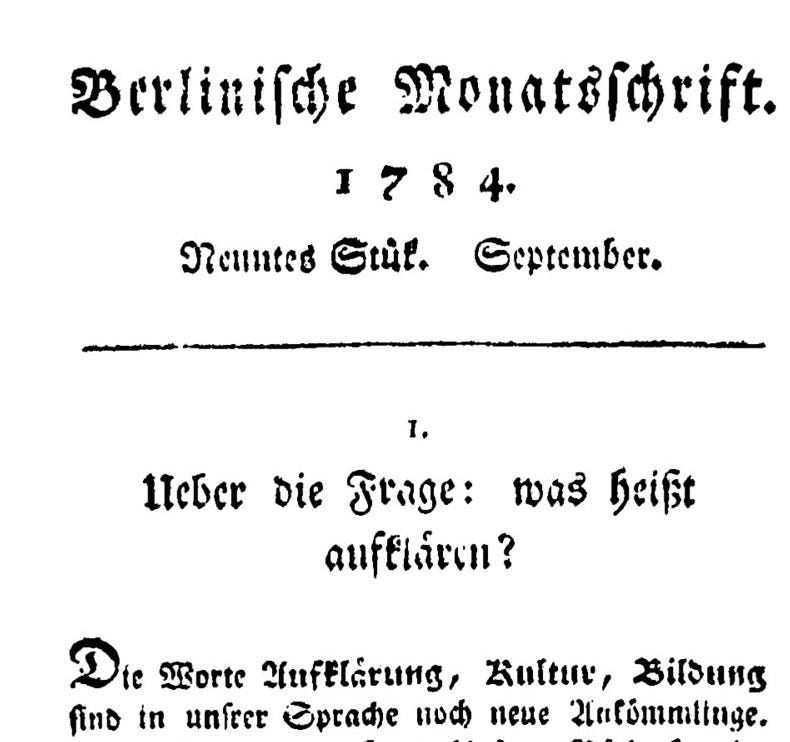"As often as one wanted to seize the crime, it saved itself in the sanctuary."
Philosopher Moses Mendelssohn and what lessons the Medical Freedom Movement can learn 250 years later.
What did the humanist Jewish Enlightenment philosopher Moses Mendelssohn have to say on the subject of uncovering the truth?
In his essay “On the question: what does enlightenment mean”, published in 1784, Mendelssohn formulates fundamental reflections on the concepts of enlightenment, culture and education. Even though the publication was prompted by a phlilosophical debate that took place almost 250 years ago, its core ideas can be related to the current situation, in which the German public is debating the minutes of the Emergency Committee held at the Robert-Koch-Institute (RKI) during the years of what prominent “truthers“ still call “the pandemic”, while they continue to keep quiet about the censorship of a fellow investigational thinker and truth teller, Mike Yeadon.
In its defence, the AfD parliamentary group had justified its act of censorship against Dr Michael Yeadon by claiming, among other things, that his presentation was likely to damage the AfD. The group, which is part of the ‘opposition’ in the German Bundestag, also distanced itself from Yeadon’s message, who had warned in his lecture, according to a recorded simultaneous interpretation, that “most people on this planet could be murdered by means of the genetic injections”. Holocaust survivor Vera Sharav, who was charged with trivialising the Holocaust for making such warnings in her speech on the occasion of the 75th anniversary of the proclamation of the Nuremberg Code on 20 August 2022, takes a similar stance.
In his essay from 1784, Mendelssohn indeed speaks of a “fine borderline” that is difficult to find:
"[W]hen certain useful (...) truth may not be disseminated without tearing down the principles of religion and morality which now attend it; the virtue-loving enlightener will proceed with caution and circumspection, and will rather tolerate prejudice than at the same time expel the truth so firmly entwined with it." - Moses Mendelssohn
The fact is that Yeadon's warning is dismissed by governments and scientific institutions as a “conspiracy theory”. Spreading this warning would lead the public to reject all investigations in search of the truth as “untrustworthy”, say even those who admit behind closed doors “that Mike is right”.
So would Mike Yeadon have been better off keeping quiet?
It would be difficult to use Moses Mendelssohn as a key witness in favor of such an opinion. On the contrary. Even 250 years ago, the “wise man of the world” Mendelssohn knew that such accusations were often “hypocrisy”.
“Of course, this maxim has always been used as defence by hypocrisy, and we have many centuries of barbarism and superstition as a reward for it. As often as one wanted to grasp the crime, it saved itself in the sanctuary.” - Moses Mendelssohn
Mendelssohn knew that enlightenment was not an end in itself. It is pursued for the purpose of “reflection on matters of human life, according to the measure of their importance and their influence on the destiny of man.”
“I always set the destiny of man as the measure and goal of all our endeavours and endeavours, as a point to which we must direct our eyes if we do not want to lose ourselves.” — Moses Mendelssohn
Not only in this short essay, but also in his larger works, such as the book “Phaedon or on the Immortality of the Soul”, the “destiny of man” is the measure of all things for Moses Mendelssohn.
This makes Mendelssohn more relevant than ever in times like ours where the sovereignty of the individual is coming under fire from governments and “opinion leaders” such as WEF consultant Yuval Noah Harari.
Harari is also relevant in this debate about RKI documents because he reduces humans to the level of a “hackable animal”. In doing so, he denies “humans destiny” and sovereignty which, for Moses Mendelssohn, is precisely what distinguishes humans from animals.
“Without the essential destinies of man, man sinks to the level of cattle.”
— Moses Mendelssohn
It is this dimension that Mike Yeadon wants to bring into focus with his warning: the possibility exists, says Yeadon, that the genetic injections, which Professor Stefan Homburg continues to call “vaccinations” (and thus dangerously trivialises), deprive humans of their purpose, irrevocably change them or even kill them.
Enlightenment, according to Mendelssohn is part of education. Culture is the second part of it. Language, dialogue and debate are an expression of culture. Those who continue to silence Yeadon by withholding his lectures from the public, or by Yeadon's colleagues remaining silent about this extraordinary act of censorship instead of showing solidarity with him and calling for a debate on this essential “contentious issue”, are trivialising enlightenment.
There is no way around a thorough debate about Mike Yeadon's warning!
Please note that Mike Yeadon is not alone in his warning. Dr. Jonathan Couey, too, is vocal about transfection of healthy humans being criminally negligent and the criminal enterprise of the U.S. Childhood Vaccine Schedule. For the sake of this article I chose to focus on the act of censorship against Mike Yeadon.



I don't think it is a good idea to pay attention to any of the ideas or writings of anyone associated with humanism or enlightenment philosophy. Such men, who well knew where their ideas would lead, are the architects of the current dissolution of our culture masquerading as the new world order.